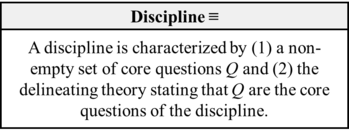Difference between revisions of "Discipline (Patton-Al-Zayadi-2021)"
Paul Patton (talk | contribs) |
Paul Patton (talk | contribs) |
||
| Line 6: | Line 6: | ||
|Authors List=Cyrus Al-Zayadi, Paul Patton | |Authors List=Cyrus Al-Zayadi, Paul Patton | ||
|Formulated Year=2021 | |Formulated Year=2021 | ||
| − | |Description=A discipline is characterized by a non-empty set of [[Core Question| core questions]] ''Q'' and a [[Delineating Theory| delineating theory]] stating that ''Q'' are the core questions of the discipline.[[CiteRef::Patton and Al-Zayadi (2021)]] | + | |Description=A discipline ''A'' is characterized by a non-empty set of [[Core Question| core questions]] ''Q<sub>CA</sub>'' and a [[Delineating Theory| delineating theory]] stating that ''Q<sub>CA</sub>'' are the core questions of the discipline.[[CiteRef::Patton and Al-Zayadi (2021)]] |
| − | The [[Scientific Mosaic|scientific mosaic]] consists of [[Theory|theories]] and [[Question|questions]].[[CiteRef::Barseghyan (2015)]][[CiteRef::Barseghyan (2018)]][[CiteRef::Rawleigh (2018)]][[CiteRef::Sebastien (2016)]] As a whole, a discipline consists of a set of accepted questions, and the theories which provide answers to those questions, or which those questions presuppose. [[CiteRef::Patton and Al-Zayadi (2021)]] Questions form hierarchies, with more specific questions being [[Subquestion| subquestions]] of more general questions. Theories find a place in these hierarchies, since each theory is an attempt to answer a certain question, and each question presupposes certain theories. Because of such hierarchical relations, it is possible to characterize a discipline by identifying a set of [[Core Question| core questions]]. These core questions are judged by some [[Epistemic Agent| agent]] to be related to one another, essential to a discipline, and definitive of its boundaries. The other questions of a discipline are subquestions of its core questions. | + | The [[Scientific Mosaic|scientific mosaic]] consists of [[Theory|theories]] and [[Question|questions]].[[CiteRef::Barseghyan (2015)]][[CiteRef::Barseghyan (2018)]][[CiteRef::Rawleigh (2018)]][[CiteRef::Sebastien (2016)]] As a whole, a discipline ''A'' consists of a set of accepted questions ''Q<sub>A</sub>'', and the theories which provide answers to those questions, or which those questions presuppose. [[CiteRef::Patton and Al-Zayadi (2021)]] Questions form hierarchies, with more specific questions being [[Subquestion| subquestions]] of more general questions. Theories find a place in these hierarchies, since each theory is an attempt to answer a certain question, and each question presupposes certain theories. Because of such hierarchical relations, it is possible to characterize a discipline by identifying a set of [[Core Question| core questions]], ''Q<sub>CA</sub>''. These core questions are judged by some [[Epistemic Agent| agent]] to be related to one another, essential to a discipline, and definitive of its boundaries. The other questions of a discipline are subquestions of its core questions. |
| − | A set, as such, can't be part of a scientific mosaic consisting of theories and questions. We, therefore, take a discipline to be defined by a [[Delineating Theory| delineating theory]] that identifies the set of core questions ''Q'' characterizing that discipline. | + | A set, as such, can't be part of a scientific mosaic consisting of theories and questions. We, therefore, take a discipline to be defined by a [[Delineating Theory| delineating theory]] that identifies the set of core questions ''Q<sub>CA</sub>'' characterizing that discipline. |
|Resource=Patton and Al-Zayadi (2021) | |Resource=Patton and Al-Zayadi (2021) | ||
|Prehistory= | |Prehistory= | ||
Latest revision as of 16:54, 3 August 2021
This is a definition of Discipline that states "A discipline is characterized by (1) a non-empty set of core questions Q and (2) the delineating theory stating that Q are the core questions of the discipline."
This definition of Discipline was formulated by Paul Patton and Cyrus Al-Zayadi in 2021.1
Contents
Scientonomic History
Acceptance Record
Suggestions To Accept
Here are all the modifications where the acceptance of this definition has been suggested:
| Modification | Community | Date Suggested | Summary | Verdict | Verdict Rationale | Date Assessed |
|---|---|---|---|---|---|---|
| Sciento-2021-0006 | Scientonomy | 1 August 2021 | Accept new definitions of subquestion, core question, core theory, discipline, delineating theory, subdiscipline, and discipline acceptance. | Open |
Question Answered
Discipline (Patton-Al-Zayadi-2021) is an attempt to answer the following question: What is discipline? How should it be defined?
See Discipline for more details.
Description
A discipline A is characterized by a non-empty set of core questions QCA and a delineating theory stating that QCA are the core questions of the discipline.1
The scientific mosaic consists of theories and questions.2345 As a whole, a discipline A consists of a set of accepted questions QA, and the theories which provide answers to those questions, or which those questions presuppose. 1 Questions form hierarchies, with more specific questions being subquestions of more general questions. Theories find a place in these hierarchies, since each theory is an attempt to answer a certain question, and each question presupposes certain theories. Because of such hierarchical relations, it is possible to characterize a discipline by identifying a set of core questions, QCA. These core questions are judged by some agent to be related to one another, essential to a discipline, and definitive of its boundaries. The other questions of a discipline are subquestions of its core questions.
A set, as such, can't be part of a scientific mosaic consisting of theories and questions. We, therefore, take a discipline to be defined by a delineating theory that identifies the set of core questions QCA characterizing that discipline.
Reasons
No reasons are indicated for this definition.
If a reason supporting this definition is missing, please add it here.
Questions About This Definition
There are no higher-order questions concerning this definition.
If a question about this definition is missing, please add it here.
References
- ^ Patton, Paul and Al-Zayadi, Cyrus. (2021) Disciplines in the Scientonomic Ontology. Scientonomy 4, 59-85. Retrieved from https://scientojournal.com/index.php/scientonomy/article/view/37123.
